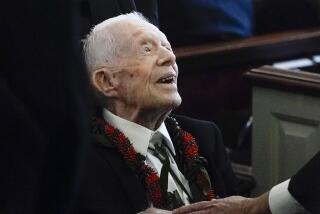Jimmy Carter discusses his cancer, earning admiration for courage and grace
When Jimmy Carter was elected president, he offered a kind of balm for a country sickened by the Watergate scandal and disillusioned by the Vietnam War. He was a simple, plain-spoken man of faith, who said he would never lie and promised a government as good as the American people.
In four years, the former Georgia governor seemingly shrank before the country’s eyes. Dour and uninspiring, he appeared lost in the byways of Washington and overmatched by the role of president. After one term, the American people decided they could do better, and replaced him with the affable Ronald Reagan.
The decades since have been a model of civic virtue, as Carter brokered international agreements, monitored elections and, hammer in hand, built shelter for poor people the world over. His political standing didn’t much improve, but he was widely hailed for the nobility of his unceasing efforts.
On Thursday, the nation’s 39th president wrote a new, and perhaps final, chapter in his book of inspiring works, revealing that the cancer found recently in his liver had spread to his brain. He delivered the straightforward news with courage, clarity and a much remarked-upon grace.
“I’ve had a wonderful life. I’ve had thousands of friends. I’ve had an exciting, adventurous, gratifying existence,” the 90-year-old Carter said Thursday at a news conference broadcast nationally from the Carter Center, his humanitarian organization in Atlanta.
His shoulders were hunched, but his voice was firm and his eyes clear as he dispassionately discussed the radiation he faced, the details of his medical condition and its impact on the daily workings of the Carter Center. He spoke almost as if in the third-person.
“I was pleasantly surprised that I didn’t go into an attitude of despair or anger or anything like that,” Carter, who turns 91 in October, said of his diagnosis.
It was a performance — if that is a suitable word — that was characteristically simple, plain-spoken and steeped in a deep, abiding faith. “It’s the real Jimmy Carter, no question,” said Hodding Carter III, a former State Department spokesman, who is no relation to the former president.
“It was not hard to read him. To the contrary, it was a guy talking about his situation and saying it in an utterly accessible way,” said Hodding Carter, who was a frequent TV presence during the Iranian hostage crisis.
At one point Thursday, the former president made lighthearted reference to the standoff, arguably the low point of his time in the White House and certainly a major contributor to his defeat after one term in office.
Asked if he wished he had done anything differently, Carter declined to wax grand. Rather, he drew laughs by saying he wished he had sent “one more helicopter” on a botched attempt in 1980 to rescue the hostages.
“We would have rescued them, and I would have been reelected,” Carter said, with his famous toothy grin.
The accolades quickly poured in from across the political divide. Well-wishers included President Obama, his fellow Democrat, and former Republican President George H.W. Bush. (Carter, an occasional thorn to subsequent administrations, joked that it was the first he had heard from some well-wishers in quite a while.)
David Axelrod, Obama’s onetime chief strategist, said on Twitter, “President Carter just taught us all a lesson in facing up to our own mortality.” Ken Khachigian, a Reagan speechwriter, praised his courage and dignity, calling it consistent with the way he conducted his post-presidency.
The medical facts Carter revealed were worrisome: Doctors still don’t know the source of the melanoma, which was first detected in his liver during an exam in May when Carter came down with a cold. The former president had been in Guyana to observe an election and had to cut the trip short.
Doctors removed a malignant tumor and about one-tenth of Carter’s liver in early August. Later, medical scans of his head and neck revealed four small spots on Carter’s brain.
“I just thought I had a few weeks left,” he said. “But I was surprisingly at ease — much more so than my wife was.”
A stoic Rosalynn Carter, his wife of 69 years, looked on from the front row.
No cancer has been discovered in the former president’s pancreas; pancreatic cancer has killed four family members.
Carter, the second-oldest living president — just a few months younger than George H.W. Bush — said he was in little pain and expressed hope that would continue.
Carter also said he would like to return to Nepal in November on his annual house-building visit with Habitat for Humanity, another of the charities long associated with the ex-president.
Carter said he would “fairly dramatically” cut back his work at the Carter Center, something he has discussed for years. “The Carter Center is well prepared to continue on without any handicap,” he said.
The winner of the 2002 Nobel Peace Prize promised he would continue teaching Sunday school, as he has for decades.
But first he plans to host his large family Saturday at Rosalynn’s 88th birthday celebration in their hometown of Plains, Ga.
@markzbarabak
@MattDPearce
ALSO:
House lawsuit against Obama is turning into a real problem for the president
NASA contractor’s earnings soar after rocket blows up
What’s to blame for the California drought?
More to Read
Sign up for Essential California
The most important California stories and recommendations in your inbox every morning.
You may occasionally receive promotional content from the Los Angeles Times.











